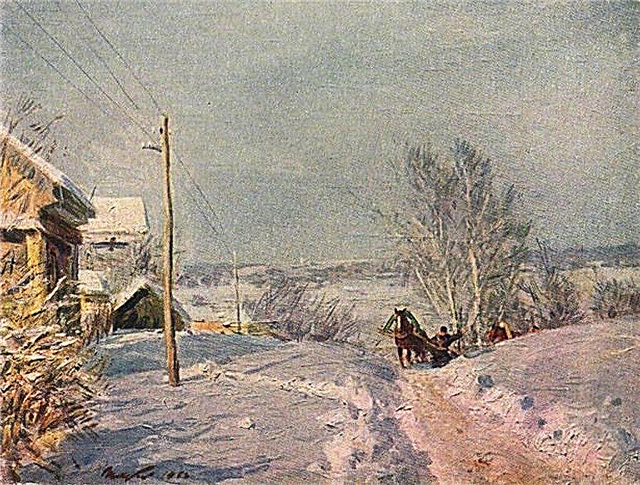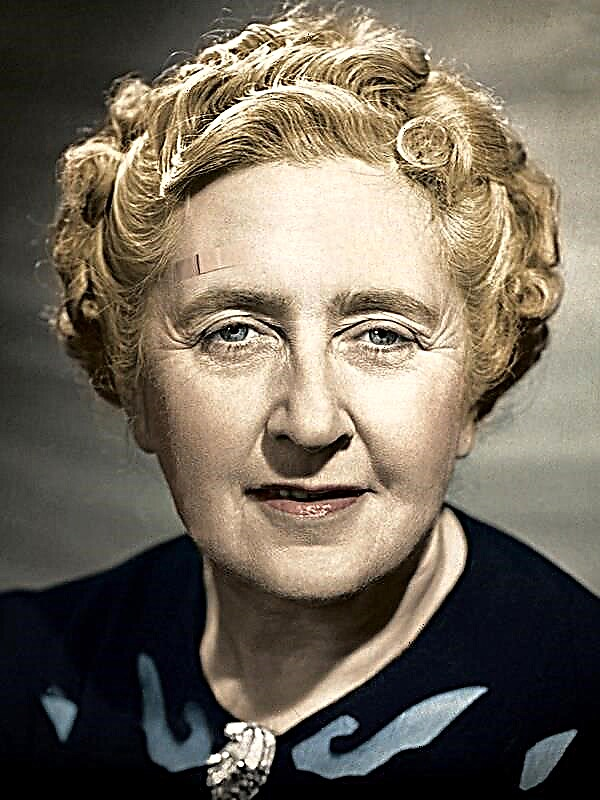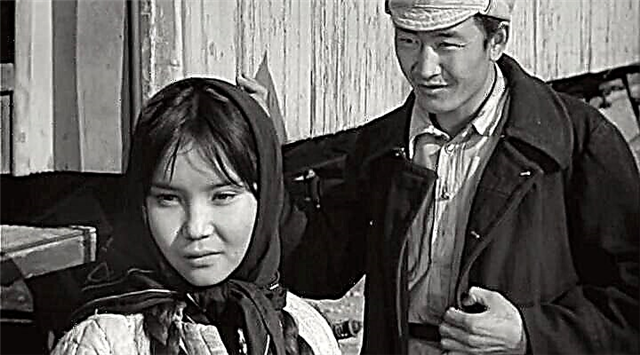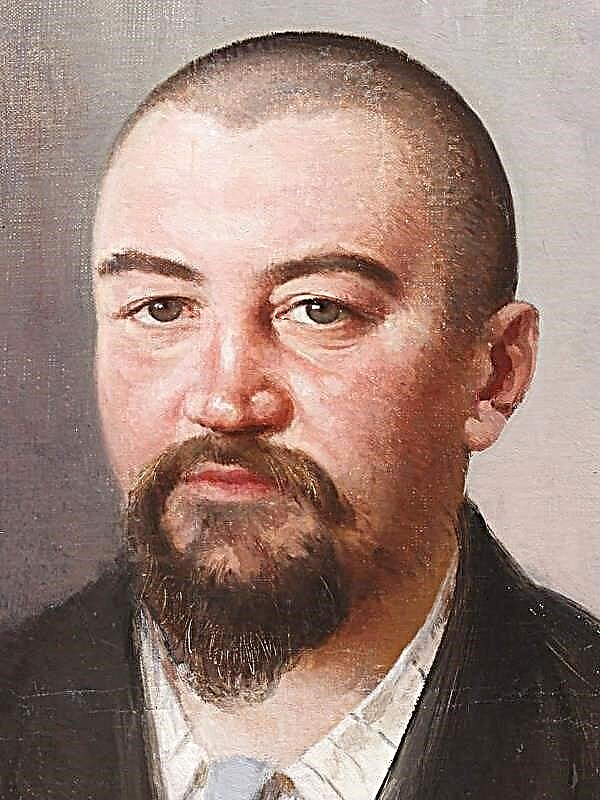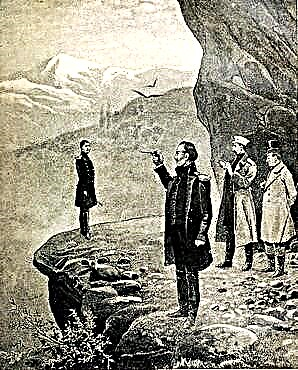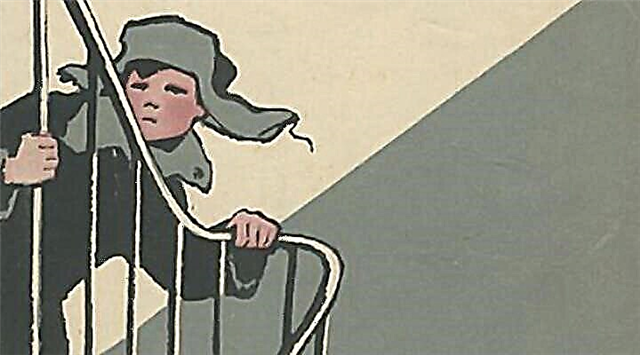We meet a young hero when he is completely possessed by two passions - to the theater and Mariana, and he is full of happy enthusiasm and enthusiastic plans. His father, a venerable burgher, created his initial capital by selling a collection of his father's paintings, and then made a fortune by successful trading, now he wants his son to increase family capital in the same field. Wilhelm strongly disagrees with the fate of the merchant prepared for him. The young man is convinced that his calling is a theater, which he fell in love with since childhood. True, when he touched the world of urban bohemia, he was somewhat surprised that the actors were much more earthly creatures than he had previously thought. They quarrel, gossip, intrigue, settle accounts with each other on petty occasions, are envious and capricious. However, all this does not change Wilhelm’s decision to devote himself to creativity. His lover, actress Mariana, seems to the hero to be perfect. Having achieved her reciprocity, Wilhelm spends evenings in her arms, and in his free time devotes poetry to her and dreams of new meetings. In vain, his neighbor, the son of his father's companion Werner, in every possible way warns William of this destructive passion. The hero firmly decided to offer Mariana a hand and a heart, together with her to leave for another city and try his luck in a theater led by his acquaintance Zerlo. As for the cold and prudent Werner, he and William are the antipodes, although close friends. The difference in views and temperament only strengthens their sincere affection for each other.
In the meantime, Mariana is also warned by her old servant, who believes that Wilhelm is “among those lovers who can only donate their heart, but bring the bride to what.” The old woman convinces the troubled girl not to break with the rich patron, whom Wilhelm is not aware of. And one evening, when William languishes in blessed thoughts of Marian and kisses her silk scarf, a note falls out of him: “How I love you, you fool! .. Today I’ll come to you ... Isn’t that I sent you a white negligee to hold a white sheep in my arms? .. "
... The whole being and all being of William shakes to the ground after this collapsed blow. Endless torment ends in severe fever. Having recovered with difficulty, the young man reassesses not only his former love, but also his poetic and acting talent. Werner fails to keep his friend when he throws packs of sheets of paper into the oven. Having broken with muses, the young man with zealous obedience is engaged in fatherly affairs. So in dull monotony years pass. He conducts correspondence and credit books, travels with assignments to debtors. In one of these trips, Wilhelm lingers for several days to relax a bit. His mental wound was already slightly healed by that time. Now his conscience is tormenting him more and more - hasn’t he left the girl too abruptly, having never met her again? What if everything turned out to be a slight misunderstanding?
Nevertheless, the young man was already sufficiently healed to open up to new impressions and hobbies. In the inn, where he stopped, a motley company soon formed - mainly from the actors who came together here, without any engagement. Wilhelm is gradually getting closer to comedians, driven by a long-standing love of the theater. His new friends are the frivolous coquette of Owl, husband and wife Melina, the bearded and unsociable old harper and other servants of Bohemia. In addition, he becomes the patron saint of the thirteen-year-old savage Mignona, a cable dancer in a boyish robe. For a few thalers, William frees the girl from the evil master. Here in the inn from the lips of an accidental visitor, he learns that Mariana, after their separation, left the theater, was in poverty, gave birth to a child and later her trace was lost. Once upon a time, noble gentlemen call in to the inn, concerned about how to entertain the expected Prince. They invite the whole troupe to the baron’s castle nearby, By this time, with the money borrowed from Wilhelm, Melina had already bought out the props and scenery of the local bankrupt theater. Everyone is full of hope to become an independent team.
Staying in the castle allows comedians to take a break from worries about their daily bread. Wilhelm also meets here with people who have an important role to play in his fate. First of all, this is the assistant to the baron, a certain Yarno, a man of extensive knowledge and a sharp skeptical mind. It was he who introduced Meister to the world of Shakespearean drama. The young man is also patronized by the charming countess, who, with her husband, count, is in the castle. She willingly listens to the poems and poems of William, of those that miraculously survived. It is time to leave the hospitable shelter. Generously awarded and hopeful comedians head to the city. Friendly to all, William is now their kind genius and soul of the troupe. But this is not for long. The trip is interrupted by a meeting with an armed detachment that attacks the actors. All things are stolen from them, and William is seriously injured.
He comes to his senses in a clearing, seeing only the eagle owl, the Minion and the harpist nearby. The rest of the friends fled. After some time, an unfamiliar beautiful horsewoman leans over a wounded youth. She gives him first aid, sends for a doctor, gives money. Her servant delivers William and his companions to the nearest village, where the rest of the actors are waiting. This time they attack the recent idol with abuse, reproaching him for all sins, but William stubbornly and meekly responds to their ingratitude. He vows not to leave them until the troupe's position is completely safe. After some time, the actors, having taken letters of recommendation from Meister, leave him to get into the Zerlo Theater, located in the nearest city. Wilhelm stays with the old harper and Mignon, who cares for him. He is gradually recovering. The image of a beautiful Amazon lives in his soul. He is covered in some kind of almost mystical haze, as if he were doubling, at times reminiscent of the sweet countess with whom William was friendly in the castle, and at such moments the young man seems to be raving. In the end, Wilhelm "in the strange company of the Minions and the old man hurried to flee from inaction, in which fate again and for too long tormented him."
They get to the Zerlo Theater, and here Wilhelm again feels in his native element. At the first meeting with the director of the theater, he proposes to stage Shakespeare's Hamlet, "expressing the worldly hope that excellent Shakespearean plays will constitute an era in Germany." Immediately, in front of Zerlo and his sister, theater actress Aurelius, Wilhelm passionately develops his understanding of tragedy. He quotes the lines: “The course of life is irregular, and I will throw it into hell so that everything goes smoothly,” explaining that they give a key to Hamlet’s entire behavior. “It is clear to me that Shakespeare wanted to show: a great deed that gravitates over a soul that cannot do such an act ... Here the oak is planted in a precious vessel, which was appointed to cherish only tender flowers in its bosom; the roots grow and destroy the vessel ... "
Aurelius soon becomes a friend of William and once reveals his secret about the unhappy love of a certain Lothario, a noble nobleman. Filina had already informed Wilhelm that the three-year-old Felix, who lives in the house of Zerlo, is the son of Aurelius, and Wilhelm mentally considers Lothario the father of the boy, not daring to ask directly. The old nanny Felix is still ill, and the baby becomes attached to Mignon, who happily studies with him and teaches him his lovely songs. Like the old half-mad harper, the girl is distinguished by a bright musical talent.
During this period, William is overwhelmed with sad news - after a sudden illness, his father died. “Wilhelm felt free in a period when he had not yet managed to come to an agreement with himself. His thoughts were noble, his goals were clear, and his intentions, it would seem, were nothing reprehensible. ” However, he lacked experience, and he still followed "the light of other people's ideas, like a guiding star." In this state of mind, he receives an offer from Zerlo to sign a permanent contract with him. Zerlo promises, in the case of William's consent, to give work to his fellow actors, whom he had not previously granted. After some hesitation, the young man agrees to accept the offer. “He was convinced that only at the theater could he complete the education that he desired for himself,” only here he could realize himself, that is, “achieve the full development of himself, such as he is,” which he vaguely sought from a young age. In a detailed letter to Werner, to whom he entrusts while taking care of his inheritance, William shares his innermost thoughts. He complains that in Germany, only a noble person, a nobleman, is available comprehensive personal development. The burgher, who is William by birth, is forced to choose a certain life path and sacrifice integrity. “The burgher can gain merit and at best form his own mind, but he loses his personality, no matter how much he has used up.” And only on the stage, concludes Wilhelm, "an educated person is as full a person as a representative of the highest class ...". Wilhelm signs a contract with Zerlo, after which the whole unlucky troupe is accepted into the theater. Work begins on Hamlet, which was translated by Wilhelm himself. He plays the role of Prince, Aurelius - Ophelia, Zerlo - Polonius. In joyful creative unrest, the premiere is approaching. It passes with great success. The scene of Hamlet meeting with the Ghost makes a special impression on everyone. It is not familiar to the public that none of the actors guesses who played the role of the Ghost. This man in the hood came just before the start of the performance, on the stage did not take off his armor and quietly left. In this scene, William experienced a true shudder, which was transmitted to the audience. After this episode, the enthusiasm and confidence did not leave the actors. The success of the performance is celebrated by a bohemian feast. And from the Ghost that disappeared without a trace in the hands of William there remains only a piece of smoky fabric with the inscription: “Run, youth, run!”, The meaning of which remains unclear to the hero.
A few days after the premiere at the Zerlo Theater, a fire occurs. The troupe is having difficulty restoring the destroyed scenery. After the fire, Owl disappears with a fan, Aurelius is seriously ill, and the old harpist is almost completely damaged in his mind. Wilhelm is busy taking care of the weak and takes care of the children - Minion and Felix. He instructs the harper to the local doctor. While he is busy with these troubles, in the theater, so to speak, the management style is changing. Now everyone is ruled by Zerlo and Melina. The latter laughs "at the Wilhelm ... claims to lead the public, and not follow her lead, and both unanimously agreed among themselves that it was only necessary to rake in money, get rich and have fun." Wilhelm is not at ease in such an atmosphere. And then there is an excuse to temporarily leave the theater. Aurelius is dying. Before her death, she hands William a letter to Lothario, adding that she has completely forgiven him and wishes him all happiness. She asks Meister to personally convey her message to Lothario.
At the bedside of the dying Aurelius, the doctor gives Wilhelm a certain manuscript - these are notes of one of his patients, already dead. But in essence, this is the story of a beautiful female soul, a woman who managed to gain extraordinary spiritual independence and defend her right to the chosen path. She was able to overcome secular conventions, reject temptations and devote herself entirely to love for her neighbors and God. On this path, she found like-minded people in a secret society. The manuscript introduces William into the world of a noble family, amazing in its nobility and beauty. He learns about the uncle of the deceased, a man of extraordinary intelligence and nobility, about her younger sister, who died, leaving four children in her care and uncle. He learns that one of the two nieces of the memoirist, Natalia, was distinguished by an amazing innate inclination for active good ... These “Confessions of a beautiful soul” make a great impression on William, as if preparing him for the next round in his own self-knowledge.
And here he is at Lothario, in an old castle with towers. Looking at the portraits in the living room, Wilhelm discovers in one of them a resemblance to a beautiful Amazon, about whom she never ceases to dream. The news of the death of Aurelius causes grief in Lothario, but he explains to William that he never loved Aurelius. Wilhelm passionately reminds the owner of the little Felix, but this even more strikes Lothario. He claims that the boy could not be his child. So whose son is he, feeling some kind of anxiety, perplexed by William. In the castle at Lothario, he meets his old acquaintance Jarn and the abbot, who once fell in his path. Everyone treats Meister with warm friendliness and persuade them to stay longer on the estate. He returns for a short time to the theater to pick up Mignon and Felix. An amazing discovery awaits him. In the recovered nanny Felix, he recognizes the old maid of his first lover, Mariana. And she says that Felix is his son, a child of poor Mariana. They prove that the girl remained faithful to William and forgave him. She wrote a lot to him, but Werner intercepted all her messages - well-intentioned. Wilhelm is shocked to the core. He showers Felix with kisses, praying to God not to deprive him of this treasure. He takes the children with him and again goes to the estate of Lothario. It was decided to give the minion to sister Lothario, who lives nearby, as she created something like a boarding house for girls.
Soon, new friends solemnly take William to the Tower Society. This is an order of people who are completely dedicated to the moral improvement of life. So, Lothario reflects on ways to alleviate the fate of the peasants. Vividly, as if warning William from overwhelming, “Hamletian” messianism, he remarks that a person “having achieved a certain degree of spiritual development ... wins a lot if he learns to dissolve in the crowd, if he learns to live for others, working on what he knows as his duty ". In the cramped tower hall, Meister is solemnly awarded a scroll of his fate, kept among similar scrolls. Wilhelm finally realizes that he is not alone in this world, that his life is not an accident, that it is woven into other fates and into the fate of humanity. He realizes that life is wider and more art. Jarno and the abbot seriously explain that his talent, which the young man hoped so much for, is relative and it is more important to realize himself in the boundless field of human relations. “The years of your teaching have passed,” the abbot concludes. It turns out that it was he who played the role of the Ghost in a memorable performance, which helped Wilhelm then. But his true destiny is still not a theater, but life, reflection and direct action.
Wilhelm has to learn other amazing things. It turns out that Lothario has two sisters - one of them is the countess, with whom Wilhelm once made friends, and the other, with whom Mignon is brought up, turns out to be ... a beautiful Amazon. Moreover, this is the same girl Natalia, which was discussed in the "Recognition of a beautiful soul." They meet when the news of the serious illness of the Minions comes.In the house of Natalia - and this is the house of her late uncle - Wilhelm suddenly discovers a collection of paintings of his grandfather, which he remembered from early childhood. In this way some of the most important threads of fate are connected. The minion dies in his arms. And after her death, another secret is revealed - it turns out that the girl belonged to a noble Italian family, and her father is an old harpist who, by force of irresistible circumstances, was separated from her lover and therefore lost her mind. Bitter events bring Wilhelm closer to Natalia, to whom he feels awe. They do not dare to explain themselves, but their brother helps - not Lothario, but the second, funny Friedrich anemone. Wilhelm recognizes him as an admirer of an owl. Now Frederick, happy with Filina, is arranging an engagement for William with his perfect sister. The hero gains happiness, which he could not even dream of.

